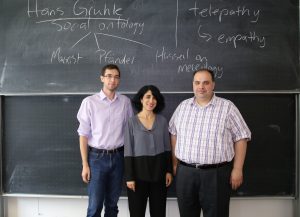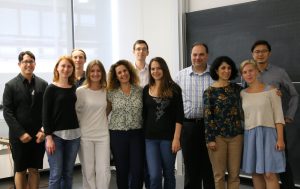Course at the first international Libori Summer School at the Center for the History of Women Philosophers, July 24-28, 2017.
The course opened with a lecture by Dr. Parker on the history of the early phenomenological movement beginning with the publication of Husserl’s Logical Investigations and Pfänder’s Phenomenology of Willing in 1900. The lecture also covered key concepts in Husserl’s phenomenology, such as the theory of intentionality, the metaphysical neutrality thesis, and the phenomenological reduction.

f.l.t.r. Dr. Rodney K.B. Parker, Prof. Dr. Ronny Miron, Prof. Dr. Antonio Calcagno (Photo by Julius Erdmann)
The afternoon seminar looked in more detail at key passages from Husserl’s WS1910/11 lectures and Ideas I, setting the stage for two contentious issues in phenomenology: the status of the I, and the existence of the external world.
The following day focussed exclusively on the life and writings on Hedwig Conrad-Martius. Prof. Dr. Miron guided the students through Conrad-Martius’ early writings (Zur Ontologie und Erscheinungslehre der realen Aussenwelt (1916) and Realontologie (1923), continuing on with the theme of the I and the external world. For Conrad-Martius there is an essential dualism with respect to the I, as well as epistemic limitations which may preclude us from knowing certain realities, but do not render a real reality inexistent or nonsensical. Prof. Dr. Miron contended that while Conrad-Martius was critical of Husserl, her thought remains true to his early writings in many ways.

Lecturers and participants at the last session. (Photo by Jessica Harmening)
The third day was led by Prof. Dr. Antonio Calcagno, who lectured on Edith Stein. The discussion began with Stein’s early work on empathy and progressed through her Philosophy of Psychology and the Humanities (1922) to her ideas about community in An Investigation Concerning the State (1925). In this lecture, we began to move away from questions about the external world as such, and toward the experience of others and ourselves as persons living with others.
Day four was devoted to Gerda Walther. Dr. Parker gave an overview of her life and work during the morning lecture, as well as a more detailed look at her dissertation on social communities. During the afternoon, students looked at an English translation of the first chapter of Walther’s Phenomenology of Mysticism, which discusses the concept of the I, the human being, and free-will.
The final day of the class began with a Q&A period where students could ask any lingering questions they might have about what had been discussed in the course. There was a lengthy discussion about Adolf Reinach and his connection to Hedwig Conrad-Martius and Edith Stein. Following this, students were invited to give short presentations on their own research.
(Rodney K.B. Parker)
You cannot copy content of this page








